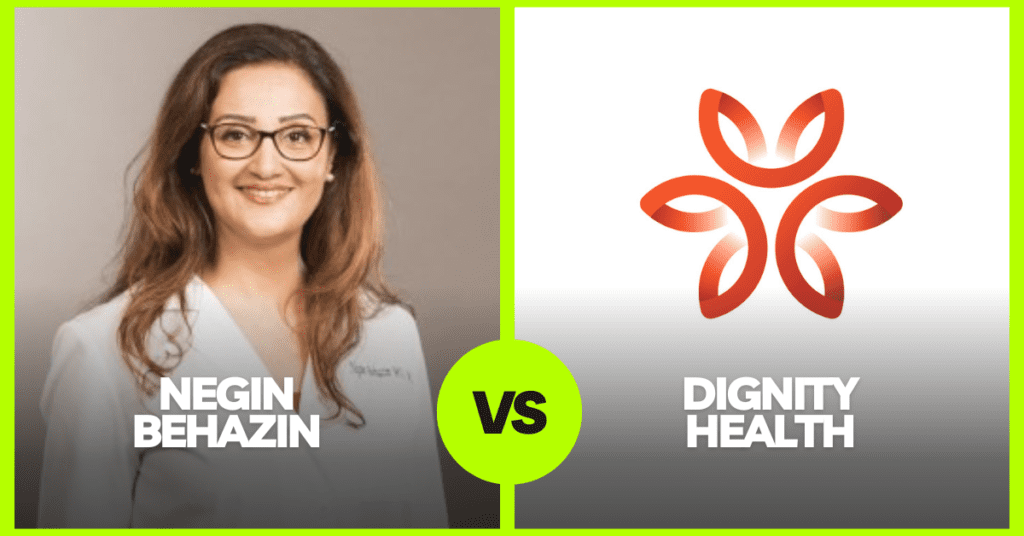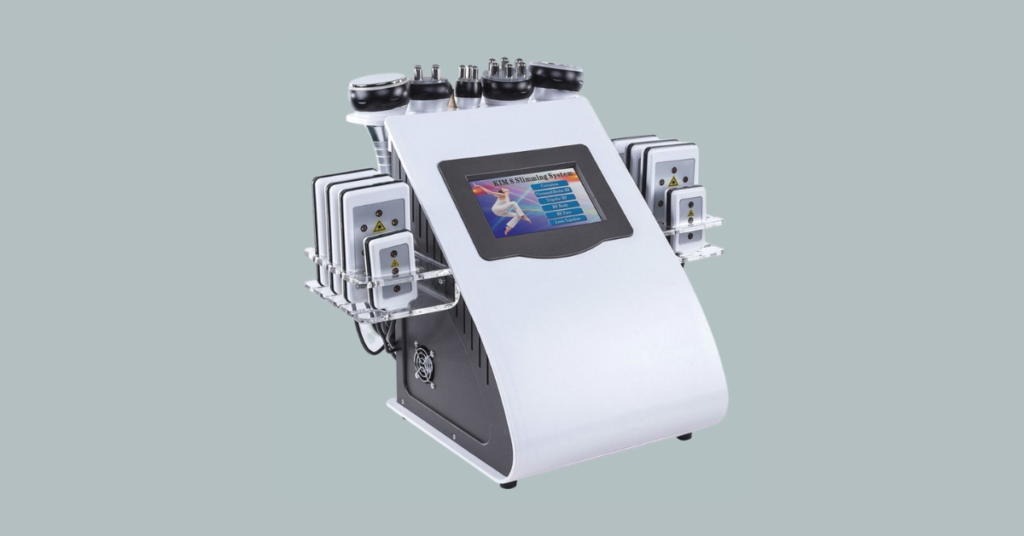Legal disputes frequently arise when patient rights clash with institutional practices in the broad and complicated world of healthcare, posing important issues of ethics and responsibility. A recent example of such a case is the continuing legal battle between Negin Behazin and Dignity Health.
Negin Behazin, an Iranian immigrant and committed healthcare professional, became involved in a dispute over patient care and religious freedom. Her experiences have sparked an important discussion about the moral obligations of healthcare organizations and have come to represent a larger battle for patient advocacy.
Dignity Health, a renowned healthcare company that runs multiple hospitals and medical facilities around the US, is on the other side of this legal dispute. It is known for its dedication to providing high-quality treatment. Its involvement in this case raises important concerns regarding the standards and procedures followed by healthcare professionals.
In this article, we are going to shed light on this case’s deep relevance and influence on healthcare and employment rights by examining the Negin Behazin vs. Dignity Health legal dispute.
Table of Contents
Negin Behazin and Her role in the case
Negin Behazin, an Iranian immigrant and healthcare worker, is a central figure in the legal battle against Dignity Health. She is a doctor; a specialist in internal medicine. She suddenly found herself in a dispute over medical care and religious freedom. The significance of patient advocacy and moral behavior in healthcare facilities has been brought home by Negin Behazin’s activities.
Her role in the case demonstrates the necessity of increased patient care standards and accountability. Negin Behazin’s tenacity and dedication to justice have triggered a wider discussion regarding patient rights and healthcare.
Dignity Health and its Significance in the healthcare industry
The well-known healthcare company Dignity Health has a large number of hospitals and clinics all around the country. Dignity Health, which is renowned for its dedication to providing high-quality care, greatly influences how healthcare is provided to patients, professionals, and the industry.
Negin Behazin vs Dignity Health: Contextual Information About Employment Dispute
Negin Behazin’s allegations against Dignity Health center around religious discrimination and the organization’s failure to accommodate her religious beliefs. She claims Dignity Health violated her rights by denying her request for a religious exemption because she is a Seventh-day Adventist. Behazin claims this denial led to unfair treatment and a toxic work environment.
Conversely, Dignity Health contends that embracing Behazin’s religious convictions would increase operational costs and jeopardize patient care. They claim that within the parameters of their business, they attempted to accommodate her reasonably.
Legal Claims and Arguments Presented by Both Parties
The claims and defenses made by each side in the legal dispute must be carefully considered. She argues that legal religious exemptions should have been made available, highlighting the significance of workplace religious freedom.
In its defense, Dignity Health argues that granting Behazin’s religious preferences would have put an excessive strain on its operations and perhaps jeopardized patient care. The timeframe that preceded the court procedures provides a powerful framework for comprehending the case. It covers everything that happened while Negin Behazin worked at the hospital, including her requests for religious accommodations, any ensuing disputes or denials. It also includes any following legal proceedings made by both sides.
The legal dispute between Negin Behazin and Dignity Health requires a review of any relevant rules or precedents. Examining pertinent legislation about religious accommodations in the workplace and earlier court judgments that may have set guiding principles or interpretations of these laws are part of this examination.
A thorough comprehension of the ongoing legal conflict between Negin Behazin and Dignity Health can be attained by looking at the accusations, defenses, arguments, timeline of events, and pertinent legal precedents or rules. This will help shed light on the complicated issues and their wider implications for religious accommodations and employment rights.
Key Arguments and Evidence by Negin Behazin’s legal team
The three primary defenses Negin Behazin’s legal team put out against Dignity Health are as follows. First, they contend that the denial of her request for a religious exemption contravenes federal and state regulations on accommodating other religions. Second, they stress the value of workplace religious freedom and opine that other options may have been considered. Last but not least, they offer witness accounts to back up charges of unfair treatment and a hostile work environment, supporting religious discrimination claims.
Dignity Health has presented refutations and defenses in response to Negin Behazin’s accusations to support their deeds and choices. It also claims that they must prioritize patient care and safety and might be compromised by providing religious exemptions without considering them.
Assessing the claims in the legal dispute between Negin Behazin and Dignity Health requires careful consideration of both sides’ evidence and witness testimony. Behazin’s team will provide evidence of religious discrimination, such as witness testimony and petitions for religious exemptions. Dignity Health will provide proof of their attempts to respect her views while considering operational and patient care requirements. Informing its decision in the case, the court will carefully consider the veracity and applicability of the evidence and testimony.
The coherence, consistency, substantiating evidence, and witness testimony will be considered in determining the merit and integrity of the arguments and evidence put out by both parties. Each argument will be evaluated by the court’s legal weight, considering any applicable rules, regulations, and cases.
The success of Negin Behazin’s legal team in proving their allegations of religious discrimination and refusal to accommodate will depend on the persuasiveness of Dignity Health’s counterarguments. The strength of Dignity Health’s defenses in defending their actions will ultimately play a crucial role in the outcome. The appraisal of the arguments and evidence will heavily influence the strength of each party’s position in the case.
Potential Implications of the Case on Employment Practices in the Healthcare Industry
Negin Behazin’s legal dispute with Dignity Health has huge ramifications for the healthcare sector. It highlights the need to respect patients’ rights, accommodate religious views, and advance moral behavior inside medical facilities.
Patient Advocacy and Rights: This case demonstrates the value of effective patient advocacy and the significance of patient rights as it emphasizes importance of respecting people’s religious beliefs and ensuring that they are taken into account when making healthcare decisions.
Observations from the Case: The legal dispute offers both people and healthcare organizations important lessons. It emphasizes how crucial it is to have explicit laws and regulations on religious accommodations, cultivate a climate of respect, and value variety in healthcare settings.
Potential Implications on Healthcare Industry Employment Practises: It emphasizes businesses’ need to thoughtfully examine and respect staff members’ religious views, preventing them from facing prejudice or a hostile work environment. The resolution of this case may impact future legal actions and industry norms for religious accommodations and hiring procedures.
The lawsuit might negatively affect Dignity Health’s reputation and legal standing.The court’s decision and the perception of the case can impact the organization’s position in the healthcare sector. It can also affect the organization’s reputation among the public.
Public Response and Media Coverage
Negin Behazin and Dignity Health’s court battle has received much media attention and public interest. Public sentiment varies; some people appreciate Dignity Health’s patient care initiatives, while others commend Behazin’s support for religious freedom and patient advocacy. The debate of patient rights, medical ethics, and religious accommodation has been greatly facilitated by media coverage, which has helped to raise awareness of these issues.
The issue has raised discussions on balancing the rights to practice one’s religion with healthcare obligations, increasing tolerance in healthcare settings, and the effects on patient care and safety. It also calls into question how the law and regulations handle such disputes.
Case Settlement and Impact on Parties
The outcome of the legal dispute between Negin Behazin and Dignity Health will have a big impact on the parties involved and on instances like this in the future.
The court’s ruling or any prospective settlement made between Negin Behazin and Dignity Health will determine the particular result of the case. It could include monetary compensation, a change in policy, or other remedies the court deems suitable.
Negin Behazin and Dignity Health will be directly impacted by how the lawsuit is resolved. A positive conclusion for Negin Behazin may validate her claims, award financial compensation, and influence changes in hospital procedures, including religious accommodations. Conversely, a poor result might be demoralizing and harm her reputation in the workplace.
The decision may influence Dignity Health’s upcoming rules and procedures involving religious accommodations and rapid changes to steer clear of similar disagreements in the future. The organization may suffer financial consequences depending on the trial outcome or the settlement achieved.
What are the Lessons from the Case in Terms of Employment Rights and Discrimination?
Important lessons about discrimination and employment rights are highlighted by the case between Negin Behazin and Dignity Health. It highlights the businesses’ need to prioritize accommodating religious practices, creating transparent rules, and promoting an inclusive workplace environment. The incident underlines the need for continued diversity and inclusion education and training.
Additionally, it emphasizes how crucial it is to advocate for and raise awareness of labor rights in the healthcare sector. The sector must put future changes into practice, enhance policies, and create an atmosphere that promotes diversity and upholds employee rights to prevent discrimination and defend employee rights.
Conclusion
The legal dispute between Negin Behazin and Dignity Health raises important questions about patient rights, accommodations for religious practices, and job discrimination in the healthcare sector. We have analyzed the claims, the court processes, and the case’s ramifications for the parties and the industry via our case study. The situation emphasizes accommodating religious practices, transparent policy, and employee advocacy.
It suggests potential adjustments and improvements in the healthcare sector to safeguard employee rights and stop discrimination. We anticipate more developments as the case progresses and look forward to seeing progress following this big court battle.



